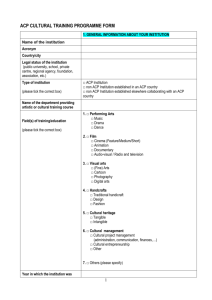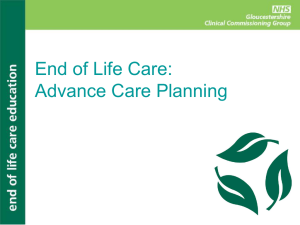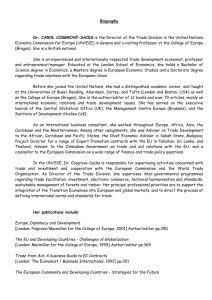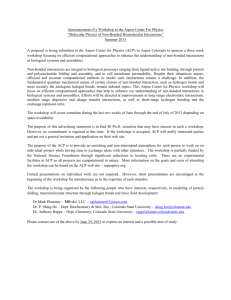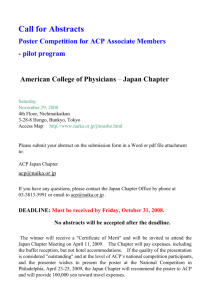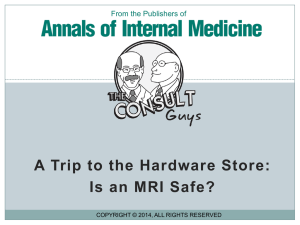The economics of advance care planning: Empirical data and ethical
advertisement
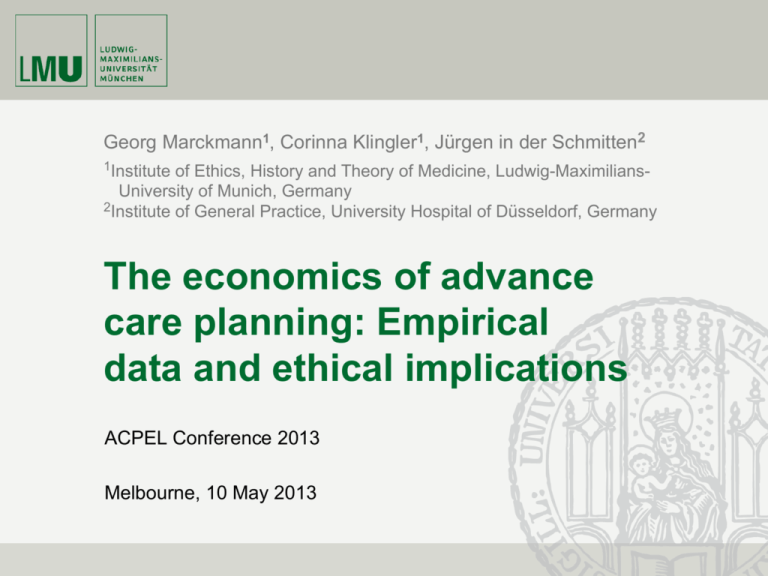
Georg Marckmann1, Corinna Klingler1, Jürgen in der Schmitten2 1Institute of Ethics, History and Theory of Medicine, Ludwig-MaximiliansUniversity of Munich, Germany 2Institute of General Practice, University Hospital of Düsseldorf, Germany The economics of advance care planning: Empirical data and ethical implications ACPEL Conference 2013 Melbourne, 10 May 2013 Background „Aggressive“, life-prolonging treatment at the end of life Individual level Often unbeneficial / unwanted care Collective/societal level Exponential increase of hc costs before death Ethically problematic! Contradicts obligations of beneficence/nonmaleficence & respect for autonomy Unwise use of scarce hc resources ð contradicts distributive justice Advance directives = solution? Reduce (unbeneficial &) unwanted care Georg Marckmann Reduce costs of care near the end of life 10.05.13 #2 Two questions… (1) Empirical question: Does the increasing use of ADs reduce cost of care? ð No convincing evidence so far ð Potential reason: No systemic ACP intervention ð Does ACP reduce cost of EOL-care? ð Systematic Review: Cost implications of ACP (2) Normative question: If ACP reduces costs: Should it be an explicit goal of ACP? ð Ethical & political discussion Georg Marckmann 10.05.13 #3 Two questions… (1) Empirical question: Does the increasing use of ADs reduce cost of care? ð No convincing evidence so far ð Potential reason: No systemic ACP intervention ð Does ACP reduce cost of EOL-care? ð Systematic Review: Cost implications of ACP (2) Normative question: If ACP reduces costs: Should it be an explicit goal of ACP? ð Ethical & political discussion Georg Marckmann 10.05.13 #4 Some methodological challenges upfront…. Challenge What qualifies as an “ACP-program”? • No universally accepted standard of required elements of an ACP-program • High variability of ACP-approaches Our approach Required elements of ACP-program • Discussion & plan of future hypothetical medical situation • Facilitated by a qualified hc professional • Systemic, regional implementation Remaining challenges Open questions • Qualification of facilitators? • Structure & content of planning process? • Elements of systemic implementation? Georg Marckmann 10.05.13 #5 Some methodological challenges upfront…. Economic evaluation Effects / Benefits • Quantitative measure of ACPeffectiveness? ð “honor patients’ well-informed preferences” • May result in shorter life-time ð loss of QALYs ð negative health benefit?!? • No CEA/CUA of ACP so far! Included: also cost-minimization studies Georg Marckmann Costs Challenges Our approach • Perspective: Institution? Payer? Societal? • Many studies assess resource consumption (hospitalization, hospital days, hospice use) • Comprehensive overall cost assessment necessary (cave cost shifting!) Included: only studies w/ outcome cost of care, all perspectives 10.05.13 #6 Systematic review: Objective & search strategy Objective: To examine the economic implications of ACP Research question according to PICO: P(atients) = all patient groups I(ntervention) = ACP C(omparator) = usual care O(outcome) = costs of care Search strategy: (advanced care planning OR synonym) AND (costs OR synonym) Synonyms for ACP used: resuscitation order*, advance(d) directive*, living will*, end-of-life decision*, end-of-life conversation*, end-of-life discussion* Synonym for costs used: price* , economic*, resource*, efficien* Or further terms found in the thesaurus… Georg Marckmann Databases searched: (1) Pubmed (2) NHS EED (3) EURONHEED (4) Cochrane Library (5) EconLit Plus: references of includes articles included 10.05.13 #7 Systematic review (3) Potentially relevant citations identified through database search, excluding duplicates (n = 852) Georg Marckmann Citations screened based on title & abstract Citations excluded (n = 823) Articles assessed for accessibility (n = 29) Articles not accessible as full text (n = 3) Full-text articles assessed for eligibility (n = 26) Full-text articles excluded (n = 19) Studies included in systematic review (n = 7) Reasons for exclusion • No ACP intervention • No empirical study • No cost assessment 10.05.13 #8 Results (1) General findings • Only 1 study with comprehensive ACP-intervention including systemic/regional implementation [Malloy et al. 2000]! • Interventions often poorly defined (“discussions about advance directives”) ð “fuzzy” boundary of ACP • ACP: often one element in a more comprehensive approach to improve end-of-life care ð impossible to assess specific effect of ACP • No real cost-effectiveness studies ð just cost-minimization studies comparing care with and without ACP ð comprehensive ACP-programs have never been subject to a formal cost-effectiveness analysis! Georg Marckmann 10.05.13 #9 Results (2) Article Intervention Study Type Cost measure Findings Malloy et al. 2000 Let Me Decide AD program RCT Average total costs per patient (18m) Can$ 3,490 (LMD) vs. Can$ 5,239 (C) ê Chambers et al. 1994 Ø (documented AD discussion) Observational study Total charges of last hospitalization $30,478 (AD) vs. $95,305 (C) ê SUPPORT Study 1995 Skilled nurse ð facilitate ACP Cluster-RCT Modeled based on Therapeutic Intervention Score Adjusted resource use ratio 1.05 = Engelhardt et al. 2006 Advanced Illness Coordinated Care Program (AICCP) Cluster-RCT Health care costs (3 m) (n=169!) $12,123 (AICCP) vs. 16,295 (C) n.s.! () Edes et al. 2006 Home-based Primary Care ð “AD discussion” Longitudinal study Health care costs (6 m) (n=43!) Net cost-savings §1,873 per patients ê Zhang et al. 2009 Ø (has MD discussed EOLwishes?) Observational study Medical costs in last week of life $1,876 (EOL-disc.) vs. $2,917 (C) ê Hamlet et al. 2010 Telephonic EOLcounseling RCT Medicare costs $40,363 (EOL-C.) vs. (C) $42,276 Georg Marckmann Trend 10.05.13 ê # 10 ACP & costs: Potential outcomes Cost difference Inefficient ð ethically not acceptable! IV + Cost ↑ Effect ↓ Cost ↑ Effect ↑ D A S Ethically not acceptable! (Priority of pt autonomy over efficiency - even w/ small β?) Georg Marckmann I + Difference in α effectiveness B Cost ↓ Effect ↓ β C III Ethically justified (Even with large α? ð burden of justification increases w/ α) - Cost ↓ Effect ↑ II Efficiency gain ð ethically mandated! 10.05.13 # 11 Two questions… (1) Empirical question: Does the increasing use of ADs reduce cost of care? ð No convincing evidence so far ð Potential reason: No systemic ACP intervention ð Does ACP reduce cost of EOL-care? ð Systematic Review: Cost implications of ACP (2) Normative question: If ACP reduces costs: Should it be an explicit goal of ACP? ð Ethical & political discussion Georg Marckmann 10.05.13 # 12 Ethical implications Possibility to reduce costs ð financial incentive to do ACP with a desired outcome (depends on perspective!) ð contradicts fundamental principle of ACP: openness of communicative process ð conflict of interest!! EOL-care preferences often not well developed ð makes ACP process especially vulnerable to external influences! Validity of documented preferences difficult to assess! Practical implications: (1) Primary objective of ACP must be to honor patients’ wishes • at lower costs ð happily welcome! • at higher costs ð still valuable use of resources (within certain limits?) (2) Quality of facilitation process is of utmost importance • qualification, certification & supervision of facilitators • defined structure and content of facilitation process Georg Marckmann 10.05.13 # 13 Conclusions Empirical question • Cost-effectiveness of comprehensive ACP-programs has not been investigated so far • Cost-minimization studies ð trend to reduced costs due to less hospital admissions and hospital days • Large variability of results [cf. Nicholas et al. JAMA 2011] • No comprehensive cost-assessment in most studies, payer perspective! (e.g. costs for n/h-stay, out-of-pocket payments are neglected) • Further studies ð clarify the required elements of an ACP-program Normative question • Primary objective of ACP: honor patients’ well informed wishes ð measure for success • Safeguard against “financial infection” of ACP-process: quality of facilitation process ð elicitate patients’ true preferences Georg Marckmann 10.05.13 # 14

